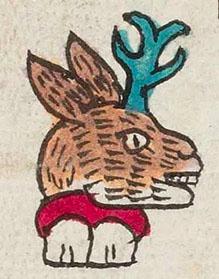Mazatlan (Mdz47r)
This compound glyph for the place name Mazatlan shows a the head of a deer (mazatl) with antlers, looking to our right, and, below the deer, two upper front teeth (tlantli) in a frontal view. The latter provide the phonetic value for the locative suffix, -tlan. The deer's coat is textured and painted brown, with some terracotta color on the upper lip and terracotta going to white on the jaw.
Stephanie Wood
The antler that clarifies that this is a deer looks more like a reed than the antlers found in later manuscripts. The turquoise color also recalls some reed plants. This is intentional, owing to the fact that the deer is metaphorically called "acaxoch," or reed flower, according to Gordon Whittaker (Deciphering Aztec Hieroglyphs, 2021, 96).
Stephanie Wood
maçatlan, puo
Mazatlan, pueblo
Stephanie Wood
c. 1541, or by 1553 at the latest
Stephanie Wood
deer, antlers, las astas, la cornamenta, venado, nombres de lugares

maza(tl), deer, https://nahuatl.wired-humanities.org/content/mazatl
tlan(tli), tooth/teeth, https://nahuatl.wired-humanities.org/content/tlantli
-tlan (locative suffix), by, near, among, https://nahuatl.wired-humanities.org/content/tlan
"Deer Place" [Frances Karttunen, unpublished manuscript, used here with her permission.]
"By the Deer" (Whittaker, 2021, 69); "Place of Many Deer" (Berdan and Anawalt, 1992, vol. 1, p. 190)
Codex Mendoza, folio 47 recto, https://digital.bodleian.ox.ac.uk/objects/2fea788e-2aa2-4f08-b6d9-648c00..., image 104 of 188.
The Bodleian Libraries, University of Oxford, hold the original manuscript, the MS. Arch. Selden. A. 1. This image is published here under the UK Creative Commons, “Attribution-NonCommercial-ShareAlike 3.0 License” (CC-BY-NC-SA 3.0).






